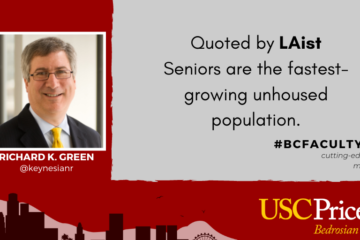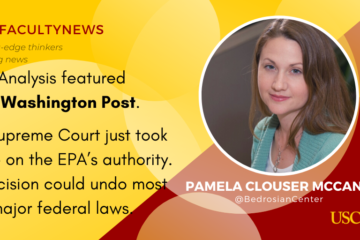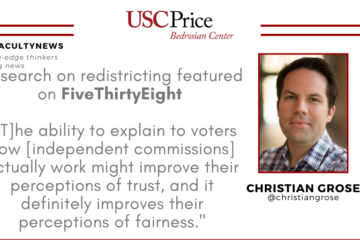Understanding Foreign Policy in the Age of Trump
by Nathan K. Micatka and Nicholas Napolio
On December 4, 2018, a group of scholars gathered at the University of Southern California to present research and perspectives on foreign policy in the age of Trump. Some important questions addressed in the symposium were: whether and to what extent Trump is similar or different from previous presidents; on what dimensions politics under Trump is a continuation of politics as usual or a disjuncture from extant trends; and broadly what the implications of Trump’s presidency are.
Leslie Johns (UCLA) began the symposium by exploring what will fill the void created by the Trump Administration’s retreat from global governance. She argued that Trump’s tariffs and withdrawal from trade pacts with allies will reduce transparency and lower participation by civil society in global markets, allowing firms to fill the void. “The weakening of global rules may also have a less expected effect at the domestic level, empowering large Multi-National Corporations to step into the void left by a hollowing out of global governance,” Johns noted, emphasizing that “leaders underestimate the comextic benefits of international commitments at their peril.”
Daniel Drezner (Tufts) followed Johns with a presentation focused on the tradeoff between politicization and expertise within the bureaucracy, suggesting the Trump Administration has been unsuccessful at creating new institutions. Conversely, Trump has succeeded in weakening the traditional foreign policy state through morale attacks, hiring freezes and early retirements, and reassigning of foreign service officials in the State Department. This is consistent with Trump’s populist worldview, where his anti-elitism targets the administrative state. Drezner concluded that “it is possible that, by the end of his time in office, Donald Trump will have unwittingly made liberal internationalism great again.”
In the third presentation of the symposium, Austin Carson (University of Chicago) explored Trump’s rhetoric, as well as institutional health and resiliency during his presidency. Using the Global Trade Alert database to assess trade violations, Carson shows that while trade violations have not increased, Trump’s rhetoric has focused significantly more on noncompliance and cheating than past presidents. Carson argues that he expects that with Trumps focus on cheating, “the consequences for global cooperation will be particularly severe.”
Jared McDonald (University of Maryland) closed the symposium with “Flip Flops and Foreign Policy under Trump.” McDonald and his colleagues study whether foreign policy position reversals hurt Trump’s perception among the American electorate. Using experimental data collected from an original survey, they assess the effect policy reversals have on Trump’s job and situational approval. They conclude that, in the realm of foreign policy, Trump’s policy reversals have no effect on his approval. Respondents generally rationalize a policy reversal if they agree with the final policy.
While McDonald’s findings are consistent with analyses of Trump’s policy reversals under different presidents and of other politicians, Drezner suggests that Trump’s presidency is unique in its management of the administrative states. Similarly, Johns and Carson suggest Trump’s approach to trade and global governance are unique both rhetorically and in practice. Together, these papers paint a nuanced portrait of the “Age of Trump,” particularly its similarities with, and differences from, previous periods of American and global politics.
“All in all, the various papers show that the Trump administration has been unpredictable on matters of foreign policy, which provides political scientists with an ongoing analytic and empirical challenge. While the president appears to be a ‘populist’ in some regards, no clear ideological strategy in the foreign realm — or ‘Trump Doctrine’ — has emerged in his first two years in office. Just as President Trump has often governed in a unique (and often impulsive) way in domestics affairs, the same has been true in international affairs.”
This group of scholars contribute informed, analytical, and empirical perspectives to current discourses surrounding the Trump presidency. Their work provides insight to all observers and subjects of American and global politics by asking us to wrestle with what the Trump presidency is, how it matters, and why it is important.



